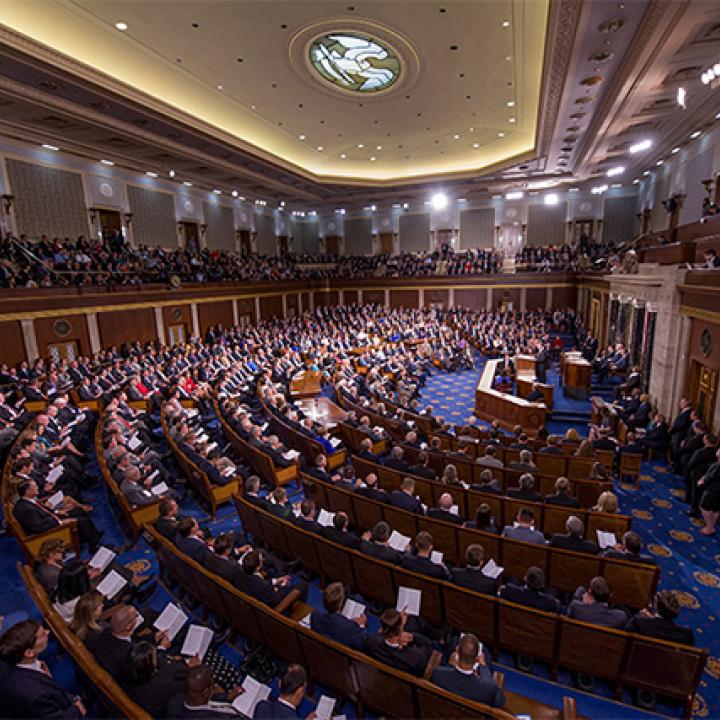
- Policy Analysis
- Articles & Op-Eds
It's Time for Congress to Come Together on Iran

The nuclear deal can't be defeated, but it can be toughened with smart bipartisan action.
As Thursday's Senate vote demonstrates, there is no longer any suspense about the fate of the nuclear deal with Iran. What remains relevant, however, are concerns about some of the key vulnerabilities of the Joint Comprehensive Plan of Action (JCPOA). Even many of its supporters have worries about what happens when Iran is no longer limited in the size or the quality of its centrifuges or nuclear infrastructure, particularly after year fifteen. Similarly, both supporters and opponents of the deal are understandably concerned about Iran using sanctions relief to provide significantly more material support to Hezbollah and other trouble-makers in the region.
Thus, shouldn't it be possible to gain bipartisan agreement on bolstering deterrence and raising the cost to the Iranians of de-stabilizing behavior in the region? Indeed, shouldn't Republicans and Democrats be able to agree on legislation that would not be inconsistent with the JCPOA but could address the need to create a firewall between Iran's threshold nuclear status and its becoming a weapons state? President Obama stated in his letter to Congressman Jerrold Nadler that "my administration will take whatever means are necessary to achieve that goal [preventing Iran from acquiring a nuclear weapon], including military means." It follows that, putting in legislation language that would support the use of force in response to an Iranian dash toward a nuclear bomb should be something the president could support. In any case this is critically needed if the Iranians and the world are to understand that force and not sanctions will be the response to Iran's violating its commitment not to pursue a nuclear weapon at any point but especially after the fifteen year period when limits on the size of the Iranian nuclear program are lifted. Similarly, since there is no civilian justification for producing highly enriched uranium (HEU), there should be no reason why the White House cannot accept legislative language that would treat the production of HEU as a trigger for the possible use of force.
In addition, we also see a need for the legislation to provide the massive ordnance penetrator (MOP) -- and the aircraft to carry it -- to Israel to reinforce Israeli deterrence. The MOP is a 30,000 pound mountain buster that would enable Israel to target Fordow, the Iranian enrichment site built into a mountain. Providing it to Israel would have the added benefit of signaling that we mean what we say about preventing Iran from ever becoming a nuclear weapons state. It would put us in a position where on our own, in concert with Israel or in support of the Israelis, we would act militarily if needed. For those who fear we would be simply handing over our decision-making on this issue to the Israelis, we could work out in advance an agreed set of indicators that would constitute an Iranian move toward a weapon and justify the use of force. In any case, doubts about America's will to respond to an Iranian dash toward a nuclear weapon may persist over time, but no one in the Middle East questions whether Israel would act militarily if Iran chose to dash toward a nuclear weapon. Few actions by the United States would do more to reinforce our declarations about deterrence than providing the MOP to Israel at some point during the life of the JCPOA. Finally, legislation that provides for select and targeted sanctions in response to a surge of material support for Iran's proxies in the region is a necessary part of a strategy designed to ensure that Hezbollah, Hamas, and other Iranian-supported militias in the area don't gain as a result of the JCPOA.
The point is that the JCPOA may block Iran's enrichment, plutonium separation, and covert paths to a nuclear bomb for the next fifteen years. That is the good news. The bad news is that it essentially legitimizes Iran as a nuclear threshold state and, like any deal on Iran's nuclear program, provides the sanctions relief that will permit Iran to do vastly more trouble-making in the region. While the JCPOA will soon become a reality, there is at this point a legislative remedy to some of the vulnerabilities that flow from the deal.
Republicans will no doubt express their opposition to the deal when votes take place in the Congress as soon as the end of this week. Both the Republicans in the Congress and the White House can choose to simply argue across the divide that separates them. Alternatively, they can focus on practical steps that also reflect the consensus that exists on preventing Iran from ever acquiring a nuclear weapon or shifting the balance of power in the region against the United States and its partners in the area. In doing so, both sides could also promote healing after what has been a bruising debate that often yielded more heat than light.
Dennis Ross is the counselor and William Davidson Distinguished Fellow at The Washington Institute. David Makovsky is the Institute's Ziegler Distinguished Fellow and director of its Project on the Middle East Peace Process.
Politico



